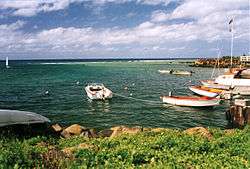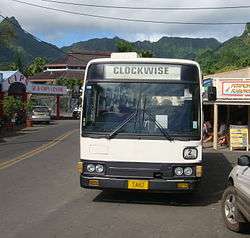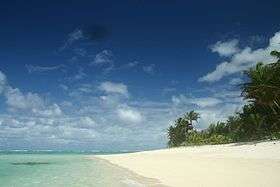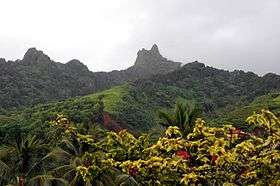Rarotonga
Rarotonga is by far the most populated of the Cook Islands and is the capital. It's in the southern group of islands, and is known as Raro.

Understand
Get in
- 🌍 Rarotonga International Airport (RAR IATA). The main gateway to the Cook Islands. There are daily services to Auckland.
The international airlines are:
- Air New Zealand operates daily services to Auckland, weekly service to Christchurch and Los Angeles
- Virgin Australia operates services to Auckland three times per week, with connections to Sydney.
- Air Rarotonga and Air Tahiti operate code-share services to Tahiti twice weekly
- Air New Zealand operates a limited service from Sydney (direct) to Rarotonga.
The Virgin Australia flights arrive and depart at midnight, and the early hours of the morning. The Air NZ flights have a more civilised arrival and departure time, but depart too early and arrive too late for connections to Australia.
Air New Zealand has code share arrangements with all other Star Alliance members including United Airlines and Rarotonga is a popular stopover on round-the-world flights.
There is an Westpac ATM at arrivals after you pass through immigration and customs. There are two duty free stores open to meet all incoming international flights. There is a cafe open in the departures area for departing flights, but don't expect to be able to get anything to eat or drink if arriving on one of the late night flights.
Get around
Rarotonga is made up districts containing several villages located mainly around the coastal fringe of the island. Avarua is the main village on the northern side of the island and has most of the population and services. People tend to refer to it as the town. Muri on the eastern side is probably the main tourist centre, with apartments and the Pacific Resort scattered around the lagoon. Aroa is on the western side is a protected lagoon and beach, and home to the Rarotongan. The airport in Nikao, is close to Avarua, about 2 km anti-clockwise.
Rarotonga's main island is encircled by a 32-km two-lane (one each way) bitumen road that is in good condition. There is also an inner road that is paved, but narrow, and doesn't quite go around the entire island due to property owners.
Expect a remarkable number of chickens to cross the road. It is hard to understand why they do this, but they do. Dogs, walkers, children, and coconuts provide other obstacles on the roads that keep driving interesting. The speed limit is 50 km/h, with 30 km/h in some towns. Allowing 30 minutes should really get you to the fartherest point on the island, provided you start off in the right direction.
The main road is called Ara Tapu. The inner road, Ara Metua, links side roads between the inner and outer roads and have more recently been given names. Addresses with just the village name in the address can be assumed to be on the main road, or not far from it. The local free maps available at the airport and tourist information are quite detailed, and list the villages, and most places of visitor interest.
If you head off on any of the unsealed roads that start off heading inland, expect them to quickly peter out to narrow unsealed roads, with stream crossings often more suited to quad bikes.
By car
If you have a driving licence from Australia, New Zealand, US, Canada, the UK or anywhere else in the EU, you can use it for up to six months. Everyone else needs a Cook Islands driving licence, which can be purchased from the police station in Avarua for $20 upon presentation of your home driving licence and passport. The licence is laminated, with your photo, so think of it as a souvenir; 10-year validity ones cost $100 and are accepted by most rental agencies worldwide. Rental car companies issue a temporary licence that is valid until noon the following day, for a fee of $2. If you are in a group of drivers, the rental car companies can issue a temporary licence to each driver, each valid until noon the day following issue. This may work for you. If you are travelling to Aitutaki it is wise to get your licence there, because it costs $2.50 instead of $20!
There are plenty of rental car choices around the island. Some operate from multiple locations. Expect to pay $50-60 per day for a small car, and $15-20 extra to pick up or drop from the airport. The opening hours, like everything else on Rarotonga, can be limited. Expect many to open around 09:00 and close again before 16:00 on weekdays; expect some to be open for very limited times on Sundays, if at all.
By motor scooter
To drive a scooter you need a Cook Islands driver’s licence. If you don't have a motorbike licence, be prepared to do a short test, which requires you to zigzag between cones to demonstrate that you are able to control a bike. The licensing section at the Police HQ in Avarua is open from 8AM until noon; and between 1PM and 3PM. The driver's licence office stops administering the tests at 2:30PM. It is best to arrive in the morning or as close to 1PM as possible to ensure that you can get your licence. Pay $20 for the licence, and $5 for the test. If you are travelling to Aitutaki it is wise to obtain your licence there, because there are no queues and it costs $2.50 instead of $20. On the other islands, nobody asks for a licence.
It is not compulsory to wear helmets by law, unless the speed for motorised scooters and motor bikes is exceeded beyond 40 km/h.
There are lots of motor scooter hire options. You will find a couple in most villages. Expect to pay around $20 per day or $100 a week for scooter hire.
By bus

Buses circle the island clockwise and anti-clockwise every hour. Clockwise buses leave town on the hour, and anti-clockwise at 25 minutes past the hour, and take around 55 minutes for the trip. The locals all own scooters, so it is usually visitors using the bus service. The anti-clockwise buses break for lunch, and don't run Saturday afternoons, Sundays, early mornings or in the evenings. The clockwise buses do not run on Sunday evenings either. The sign on the front of the bus states its direction. If you're going to use it regularly, you can buy a day pass or a book of 10 tickets.
The bus has designated stops on the map, and there are a few bus shelters around to wait in. However the bus will pick up and drop off almost anywhere on the round island route, although the drivers prefer spots where they can pull off the road to let traffic pass. Single trips are $5, return trips are $8, a day pass is $16. All-day family passes cost $26, for two adults and an unlimited amount of children in the one family (children are 15 and under). A pass for 10 one-way trips is $30.
Some buses have buttons to request a stop, but these are just for show. Pressing them will probably see you doing another lap of the island. Simply stand up and tell the driver when you want to get off. Phone number is: 25512 from 9AM until 4PM. After 4PM, call 20349.
By bike
Bicycles are a very practical way of getting around. Road speeds are slow, and taking the inner road is also an option for cyclists. It is illegal for bicycles (and scooters) to travel two abreast, and you must ride single file at the left of the lane.
Bicycle hire is available widely, most rental places and resorts have them. Don't expect them to be very high in quality.
By foot
The villages tend to be around 15-20 minutes walk from each other. Most places on the island are within walking distance to a beach, an ATM or small convenience store. There aren't many footpaths outside of Avarua & Arorangi, but traffic is slow and walking on the main road isn't a problem. Walking along the beach between villages is usually possible, especially at low tide.
See

- Rugby Union is the primary sport here, as in New Zealand. Check out a game at the National Stadium, or one of the other rugby fields around the island.
- Maire Nui Gardens, is the botanical gardens of the island, around 3 km clockwise from Muri, about 600 m past the Fruits of Rarotonga. The gardens are nicely laid out, and contain many samples of much of the fruit and flora of the islands. Admission is $3. There is a cafe in the gardens, selling coffee ($4) and light homemade quiche and focaccia ($15-20). Pineapple cheesecake is amazing ($9).
Do
Scuba diving
The diving in and around the reef is breathtaking. With warm tropical waters of around 27 °C in summer time, only a short 3-mm wetsuit is required. If you are a certified diver, you can book a dive with one of many dive operators on the main island. A two tank boat dive will cost you about NZ$140 with all equipment provided.
There are wrecks (but well broken up)to explore, small cave systems and plenty of fish. In August you should be lucky enough to experience diving with whales that are passing by the island.
Black Rock, on the west coast of Rarotonga, is great for snorkelling.
Fish life is varied and includes Hawksbill and Green turtles, White Tip and Grey Reef sharks, Napoleon Wrasse, Giant Moray, Giant Clams and the myriad of reef fish and invertebrates you’d expect to see on a coral reef.
- 🌍 Dive Rarotonga Ltd (Next to Crown Beach Resort, main road Arorangi), ☎ +682 21873, toll-free: 0800 3483 (DIVE), e-mail: info@diverarotonga.com. M-F 9:30AM-5:30PM, Sa Su 1PM-5:30PM. The only multi-agency certifying dive centre in the country both PADI and SSI. Boats are equipped with all appropriate safety gear including oxygen, first aid, life jackets, GPS, EPIRB, and marine VHF radio etc. Boat is manned by qualified skipper whilst divers are led underwater by Dive Master. $100 for 2-tank dive trip (certified divers).
- 🌍 Pacific Divers (The Cook Islands leading dive operator.), Muri, ☎ +682 22450, e-mail: info@pacificdivers.co.ck. 8AM-5PM. Established in 2001 and operated by Steve Lyon, Pacific Divers offers a diving service catering for all levels. Dives include coral terrain dives, canyons, drop offs and drifts. NZ$449 for PADI Open Water Diver.
- The Dive Centre (The Big Fish), Aroa Beach, ☎ +682 20238. 8AM-5PM. Padi 5 Star full service dive operation, direct in front of one of the best snorkel spots in Raroronga - The Aroa Marine Reserve.
They offer a wide range of courses from introductory courses up to Divemaster. Boat trips twice a day and also Lagoon dives. Onsite they have a well equipped retail shop and snorkel hire.
Events
- Te Maire Maeva Nui (Cultural Festival of music and dance) Each year, performing artists from Rarotonga and the outer islands gather at the National Auditorium in Rarotonga to present tradtional dances, songs, chants, drum beats and costumes expressing the cultural theme chosen for that particular year.
- Vaka Eiva (Canoeing Festival) The Rarotonga Steinlarger Vaka Eiva has to be rated as one of the most fun outrigger canoe festivals in the world.
Snorkelling
Snorkelling in Rarotonga is easy, and a great variety of tropical fish and corals can be seen snorkeling off the beaches in calm waters all around the island. Not all beaches are suitable - some rocky beaches are not so pleasant but head for the coral lagoons and sandy beaches.
Muri beach offers beautiful clear, shallow water - it remains shallow very far out so is ideal for beginners, and perhaps a bit better on the high tide. You can also book on a snorkeling cruise around this lagoon in a glass-bottomed boat, stopping off to snorkel by a small island, and a barbecue lunch and cultural show on the other side of the lagoon, however this doesn't really take you anywhere a competent swimmer with fins can't get to from the beach. Watch out for the currents between the island and the beach on the tide.
Snorkelling can be done at the Aroa Lagoon Marine Reserve directly in front of The Rarotongan Beach Resort & Spa, you can access the lagoon either side of the resort. The Aroa Lagoon Marine Reserve has been continuously operating as a dedicated Marine Reserve in Rarotonga as well as being a natural breeding ground for several hundreds of species of tropical reef fish. The result is that you will be able to see hundreds of fish with metres of the white sand shores of Aroa Beach. There is no need to feed the fish! and please avoid standing on the corals.
Snorkelling equipment, lessons and guided snorkelling tours (night and day) are complimentary to guests of the Rarotongan Beach Resort & Spa or are available at the Dive Centre 200 m up the road. Expect large schools of trevally, moray eels, butterfly fish, sea bream, wrasse and many other fish. Also expect to see octopi, clams, and eels.
Also try the beach in front of the Fruits of Rarotonga, which is where the first permanent marine reserve was established on Rarotonga.
In front of fruits of rarotonga the snorkeling is quite good, also try in front of The Dive centre - right next to the rarotongan.
Game fishing
Rarotonga boasts some of the best big game fishing in the Pacific. Catch marlin, tuna, wahoo and mahimahi.
Tramping

There are several inland walking tracks which can be followed for a pleasant few hours in the bush. The Needle & Cross-Island Walk crosses the island from Uruau Drive to Wigmore's Waterfall, and the Raemaru track goes up to Raemaru Peak (350m).
Rarotonga was formed by a giant, rocky volcano. Just a few thousand years ago, it collapsed into a beautiful, round island teeming with wildlife. There are lots of small peaks around the area and waterfalls hidden in mini-sanctuaries around the jungle. They are easy to tramp to and to bike to.
There are walks along streams providing opportunities for fresh water swimming.
The local guidebooks recommend a guide for the more difficult treks which cost around $60 which includes a lunch and transportation to and from the trail heads. For people who are experienced hikers this is not the case. The needle trail is marked with green markers. Guides are good for information on local flora and fauna. A guidebook is available at the Treasure Chest which has topographical maps along with information on flora and fauna.
Jet Blast
The sea wall is relatively close to the airport, you can stand on the sea wall and when the jets come in it's about ten feet above your head. Check the wind sock to see which direction the planes will land. The locals call this getting jet blasted. If getting jet blasted during landing is a bit too tame, head for the eastern end of the runway: Getting jet blasted during takeoff is much more exciting (and deafening if you live dangerously and forgo the reasonable precaution of earplugs).
Windsurfing
Muri lagoon is a great place to windsurf, although the winds are never really that strong, great for beginners. You can rent them in the building right beside the sailing club.
Buy
There are ANZ and Westpac ATMs scattered at regular intervals along the villages of the main road. All the supermarkets accept credit cards for supplies purchased above NZ$20 minimum. Currency exchange is available at the ANZ, Westpac banks and Western Union in Avarua, and the fees for exchange are around $8 per transaction.
Due to import of supplies, non-local foods and groceries are expensive, therefore it is worth the trip into Avarua to shop at the large grocery outlets. Expect the range available to be limited to service the small island population.
Black pearls are local produce, and there are several shops selling these in Avarua and other villages.
The resorts at the Rarotongan and Pacific have their own resort shops, as do some of the smaller accommodation providers.
Every Saturday (8AM to noon) there is a growers' market in Avarua, called Punanga Nui, where you can listen to live music buy music, local fruits, vegetables, fresh fish, souvenirs and cooked food platters. It ends at noon, make sure you get there before then. There is also a variety of food stalls at the market.
Eat
Local produce tends to be seasonal. Mangoes grow wild, and are plentiful and cheap during summer. Avocados are also plentiful in summer and autumn. Outside of season, however, these fruits can be hard to come by. Passionfruit, guava and paw-paw and oranges are other seasonal fruits freshly available in season. Starfruit, pawpaw and coconuts tend to be plentiful year round, and these can be just as cheap at the village convenience stores as they can be in Avarua. Fresh reef fish is available daily near the harbour in Avarua, but not in the supermarket. Taro, kumura (sweet potato), and breadfruit are also grown locally, and make delicious island fries. Island spinach known as Bele is popular, as are the leaves of the Taro, and which are commonly available.
There is an Island Night on every night at one of the resorts. Ask at tourist information for the roster for the resorts.
There a selection of more than 30 restaurants and cafes on the island to choose from. Making a booking can be a good idea, if you want to be sure not to end up hungry. Pacific Rim, Italian, pizza, Mexican, are all options, or try the seafood platter at the Sailing Club on the lagoon at Muri, with reef fish, octopus, and rukau (taro leaves). The resorts and some of the other accommodation all have a choice of restaurants.
Expect to pay $18-25 at a restaurant for a main course. Burgers at Fruits of Rarotonga cost $6. There are takeaway hot meals in Avarua for $7. Espresso coffee is available widely, expect to pay $4, look for some blends of Atiu coffee to try the local produce or coffee from the Cook Islands Coffee Company, imported beans locally roasted .
Drink

The island has major problems with waste management, so please consider using the available refilling facilities for water and beer. Drinking coconuts also produces no waste.
Vaima drinking water is locally produced. It is available in many supermarkets and can be refilled on the backroad in Avarua.
There are 2 microbreweries on the island, so before you buy imported beer and produce even more waste on the island it's a good idea to try the local beer which you both can refill:
- Matutu Brewery, Tikioki, Titikaveka (100 m anti-clockwise from Fruits of Rarotonga, 10 minutes walk from Muri), ☎ +682 26288. 9AM - 4PM. Matutu Brewery a 100% locally owned micro-brewery in the Cook Islands. The microbrewery produces Mai Lager, Kiva Pale Ale & Matutu Draught. Sales at the door, or they will fill containers. The beer is available in most restaurants to try and can be purchased at Foodland, Super Brown and Oasis supermarkets.
- Cook Islands Brewery (just behind the Budget car hire in Avarua). They offer an informal tour of the brewery (and taste of the beers on draught); look for the sign on the main road. They brew a lager, blonde, and darkie. You can buy and refill containers.
Imported alcohol can be purchased in the supermarkets and convenience stores until 9PM - but not on a Sunday.
Sleep
There are a few backpacker type places, many villas, from large complexes to one or two villas in a group. There is also resort-style accommodation.
Consider where on the island you want to stay, and pick a location near a beach or lagoon if you are looking for the beach and snorkelling activities. The accommodation providers are used to people arriving and departing at odd hours, according to the flight schedules. Don't expect any discounts for arriving at accommodation at 2AM, and expect to pay extra to check in early or to get a late checkout. Resorts like the Rarotongan and the Pacific have their rates for early and late checkout by the hour on their website.
Budget
- Backpackers International hostel. A family-run place with internet access (slow!), kitchen facilities and, it's close to the beach. The hostel also offers pick-up (and drop-off) service at the airport. 'Bill' is a great source of information about the Island and its recent history.
Mid-range
- Titikaveka Club Pacific, Tikioki Beach (on the beach), ☎ +64 21 213 2955, e-mail: rarotcp@gmail.com. On the south-east part of the island, it offers private accommodation in a relaxing location with amazing views - and a 5-second walk to the beach.
Splurge
- Crown Beach Resort (Arorangi), ☎ +682 23953, fax: +682 23951, e-mail: info@crownbeach.com. A 5-star boutique resort on the sunset coast with 2 restaurants set in beautiful gardens and an amazing white sandy beach. Romantic tropical beach weddings are their specialty.
- Edgewater Resort & Spa, Avarua, ☎ +682 254 35, fax: +682 254 75.
- Pacific Resort Rarotonga (Muri Beach), ☎ +682 20427, fax: +682 22427. 64-room waterfront resort on Muri Beach with bar and restaurant. Cultural shows on Friday nights.
- The Rarotongan Beach Resort & Spa, Aroa Beach & Marine Reserve, ☎ +682 25800. Check-in: 2PM, check-out: 10AM. Directly on Aroa Beach & Marine Reserve, snorkelling direct from the beach. Daily resort activities, swimming pool, air-conditioned rooms, and a choice of buffet ($36), a-la-carte restaurants ($18-27) and cafe ($5-10). Bar and restaurants open to guests and casual diners. Family friendly with a kids' club for young kids, and kids are welcome at the activities. Interconnecting rooms and two bedroom bungalows available.
- Vai Villas, Vaimaanga, Titikaveka (Opposite Wigmores Superstore), ☎ +682 23333. Vai Villas offers two spacious one-bedroom Pacific Island style villas overlooking the Titikaveka lagoon, a quiet and peaceful beach. NZ$275 (2 persons) - additional person $45, minimum stay 3 nights.
Connect
Mobile phone towers are at regular intervals around the island, and mobile reception is good. Roaming or picking up a prepaid SIM card are both options.
Payphones are available at the airport and in Avarua.
Wi-Fi hot spots are available in Avarua, and now widely found at the resorts, hotels, and many restaurants. You are never more than a few minutes from one, but there is no free access. Internet terminals are located in Avarua, in the resorts, and at the airport.
With the arrival of O3b the internet access price is comparable to price on continents. Telecom Cook Islands (Bluesky) offers Wi-Fi Hot spots at their office, in some hotels and restaurants, and at the airport (beware, it works only before security checks, once you're in you have no more reception and cannot finish the rest of your credit! Clever, eh?) Prepaid cards in various denominations can be purchased from the hotels and the post office. Traffic is measured by traffic, not by time. For example 200 MB will cost you NZ$5. 3 GB will cost you NZ$50.
Go next
Rarotonga is the gateway to all the other islands in the group.
The uninhabited islands of Takutea and Suwarrow can be visited by private yacht, or with a research vessel stationed at Rarotonga.